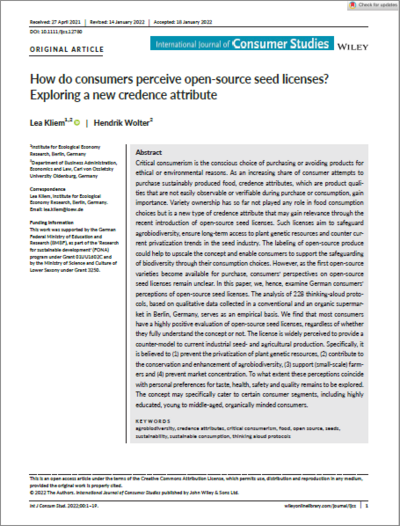How do consumers perceive open-source seed licenses? Exploring a new credence attribute
Critical consumerism is the conscious choice of purchasing or avoiding products for ethical or environmental reasons. As an increasing share of consumer attempts to purchase sustainably produced food, credence attributes, which are product qualities that are not easily observable or verifiable during purchase or consumption, gain importance. Variety ownership has so far not played any role in food consumption choices but is a new type of credence attribute that may gain relevance through the recent introduction of open-source seed licenses. Such licenses aim to safeguard agrobiodiversity, ensure long-term access to plant genetic resources and counter current privatization trends in the seed industry. The labeling of open-source produce could help to upscale the concept and enable consumers to support the safeguarding of biodiversity through their consumption choices. However, as the first open-source varieties become available for purchase, consumers’ perspectives on open-source seed licenses remain unclear. In this paper, we, hence, examine German consumers’ perceptions of open-source seed licenses. The analysis of 228 thinking-aloud protocols, based on qualitative data collected in a conventional and an organic supermarket in Berlin, Germany, serves as an empirical basis. We find that most consumers have a highly positive evaluation of open-source seed licenses, regardless of whether they fully understand the concept or not. The license is widely perceived to provide a counter-model to current industrial seed-and agricultural production. Specifically, it is believed to (1) prevent the privatization of plant genetic resources, (2) contribute to the conservation and enhancement of agrobiodiversity, (3) support (small-scale) farmers and (4) prevent market concentration. To what extent these perceptions coincide with personal preferences for taste, health, safety and quality remains to be explored. The concept may specifically cater to certain consumer segments, including highly educated, young to middle-aged, organically minded consumers.



